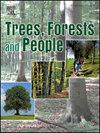Family forest landowners’ decision-making about reforestation and timber salvaging post hurricane
IF 2.7
Q1 FORESTRY
引用次数: 0
Abstract
Reforestation is critical to maintaining ecosystem functions and socio-economic benefits, particularly after extreme disturbances such as hurricanes. This study assessed the management efforts of family forest landowners in the Panhandle, Florida following the devastating impacts of Hurricane Michael (2018). We mailed a survey to 1,000 randomly selected landowners impacted by Hurricane Michael to examine 1) their reforestation and timber salvaging plans, 2) their ownership and management plans and 3) the impacts of the novel Florida Timber Recovery Block Grant (TRBG) program on forest management including any significant differences between landowners who did and did not apply for the program. We found that family forest landowners who were members of environmental or woodland owners’ organizations, had written forest management plans, had larger forest lands, or owned their forest lands for timber products were more likely to engage in reforestation. Landowners who applied for the TRBG funding were more likely to have salvage harvested timber and indicated plans to reforest their lands in the future, in comparison to those who did not apply for the grant. Our study provides insights on policy that can support family forest landowners to reforest their lands, primarily highlighting that although financial assistance is invaluable, these support programs should be thoughtfully implemented to increase landowner accessibility.
飓风后家庭林地所有者造林和木材回收决策
重新造林对于维持生态系统功能和社会经济效益至关重要,特别是在飓风等极端扰动之后。本研究评估了飓风迈克尔(2018年)的破坏性影响后,佛罗里达州潘汉德尔地区家庭森林土地所有者的管理工作。我们向1000名随机选择的受飓风“迈克尔”影响的土地所有者邮寄了一份调查问卷,调查内容包括:1)他们的再造林和木材回收计划;2)他们的所有权和管理计划;3)新的佛罗里达州木材恢复整体拨款(TRBG)计划对森林管理的影响,包括申请和未申请该计划的土地所有者之间的任何显著差异。我们发现,作为环境或林地所有者组织成员、有书面森林管理计划、拥有更大的林地或拥有用于木材产品的林地的家庭森林土地所有者更有可能参与再造林。与没有申请赠款的土地所有者相比,申请TRBG资金的土地所有者更有可能回收采伐的木材,并表示计划在未来重新造林。我们的研究为支持家庭森林土地所有者重新造林的政策提供了见解,主要强调了尽管财政援助是无价的,但这些支持计划应该得到深思熟虑的实施,以增加土地所有者的可及性。
本文章由计算机程序翻译,如有差异,请以英文原文为准。
求助全文
约1分钟内获得全文
求助全文
来源期刊

Trees, Forests and People
Economics, Econometrics and Finance-Economics, Econometrics and Finance (miscellaneous)
CiteScore
4.30
自引率
7.40%
发文量
172
审稿时长
56 days
 求助内容:
求助内容: 应助结果提醒方式:
应助结果提醒方式:


